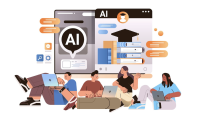Search
There are 26 results.
Category
Tag
Tag
All (78)
Active Learning (4)
Activities (4)
Analytics (4)
Assessments (11)
Asynchrony (5)
Authentic Activities (3)
Canvas (4)
Case Studies (2)
Collaboration (5)
Communication (7)
Community (6)
Competency-Based Education (3)
Content Creation (9)
Course Materials (1)
Course Preparation (4)
Discussions (5)
Diversity (1)
Equity (1)
Faculty Presence (8)
Faculty Support (1)
Feedback (10)
Formative Assessments (8)
Game-Based Learning (2)
Gamification (1)
Generative AI (5)
Grading (8)
Group Work (2)
Images (1)
Learning Objectives (2)
Multimodality (7)
Peer Review (1)
Presentations (1)
Qualitative courses (1)
Quantitative courses (1)
Rubrics (3)
Scaffolding (1)
Social Media (1)
Summative Assessments (1)
Synchrony (6)
Third-Party Tools (2)
Universal Design for Learning (UDL) (1)
Video (1)
Visual Design (1)
Workload (1)
Written Assignments (1)
The Need to Rethink Assessments in the Age of Generative AI
The rapid advancement of generative artificial intelligence (genAI) technologies has sent shockwaves through the education sector, sparking intense debates about academic integrity, assessment practices, and student learning (Roe et al., 2023; Rudolph et al., 2023; Susnjak & McIntosh, 2024; Swiecki et al., 2022; Yeo, 2023). Since the public release of ChatGPT in November 2022, educators have grappled with concerns about cheating and the potential erosion of traditional academic values (Gorichanaz, 2023; Sullivan et al., 2023). However, as our understanding of genAI capabilities evolves, so too must our approach to assessment and teaching (Lodge et al., 2023).
Group Work Best Practices Guide
Group work in online courses can facilitate student learning in unique ways. In particular, group assignments can provide students with opportunities to engage in authentic tasks and develop collaborative skills applicable to their future careers. Williams et al. (2006) argue that team learning stimulates student thinking at the higher levels of Bloom’s taxonomy, including application, analysis, synthesis, and evaluation. Group projects can serve a variety of different purposes across a wide range of academic programs and subjects. Additionally, group projects can foster interaction and community building amongst students, which can be especially valuable in an asynchronous online classroom (Martin & Bolliger, 2018).
Presentation Best Practices Guide
Many online courses focus on written communication skills, featuring discussion posts, papers, and case study reports among other assignments. However, oral communication and presentation skills are just as integral to students’ success, and, indeed, many employers list presenting as one of the most desirable skills for job candidates (Suhadi et al., 2021).
Fostering Deep Learning and Motivation in the AI Era
As generative artificial intelligence (genAI) reshapes the educational landscape, faculty must rethink traditional assessment strategies to maintain academic integrity and real-world relevance. This piece explores strategies for creating effective assessments in an AI-mediated world, focusing on two key areas: collaborative activities that develop essential human skills, and formative assessments that emphasize personal growth and deep learning. These approaches not only address concerns about AI misuse but also prepare students for future workplaces where human capabilities will complement AI tools.
Quizzes for the Multimodal Course
From trivia games to final exams, quizzing tools have a variety of uses for learning as well as assessment. Exams and quizzes have a particularly plentiful range of possibilities in a multimodal or hybrid course, where they can be administered synchronously or asynchronously. Research suggests that the presentation of a tool influences student behavior in response to the tool. When comparing two student discussion boards, one an ungraded discussion and one a graded replacement for a final exam, Cheng et al. (2013) found that students displayed more knowledge on the graded board but more evidence of learning on the ungraded board. The students who participated in the study were more likely to grapple with new ideas when the stakes were low but more eager to showcase topics they were confident about when their responses would have a greater impact on their grades. When considering quizzing tools, we recommend allowing your course goals to guide your usage.
First Time Teaching Online
The online learning environment may seem vastly different from the on-ground classroom. With the right preparation, however, you can successfully translate on-ground teaching and expertise into the online modality and create an engaging learning experience for students. In this piece, we will walk through things you’ll want to look for and decisions you’ll need to make when teaching online for the first time, regardless of what course you’re teaching. Additionally, we also provide some specific examples that are particularly relevant if you are using the Canvas learning management system.
Developing AI Literacy Across the Curriculum: A Guide for Programs and Faculty
The rapid integration of AI into professional practice across disciplines makes AI literacy increasingly crucial, not just for technology-focused fields but for all areas of study. Even faculty who are skeptical of AI's value need to consider how it's transforming their disciplines. For example, scientific fields are seeing AI adoption in literature reviews, experimental design, and data analysis. In the humanities, AI tools are already being used for textual analysis, translation, and content creation. Creative disciplines must grapple with AI's impact on artistic production and copyright. Professional programs face increasing pressure from employers who expect graduates to understand AI applications in their field.










